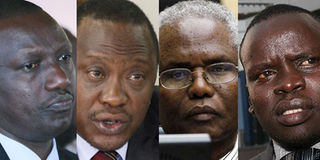ICC rejects Ocampo Four’s last appeal

From left: Eldoret North MP William Ruto, Deputy Prime Minister Uhuru Kenyatta, former head of civil service Francis Muthaura, and radio presenter Joshua arap Sang. They look set to stand trial after the court rejected their appeal on jurisdiction May 24, 2012. FILE
The cases facing the four Kenyans at the International Criminal Court will proceed to full trial after a five-judge bench rejected appeals challenging its jurisdiction to try them.
The Appeals Chamber, presided over by Ghanaian judge Akua Kuenyehia, ruled in a unanimous decision that the ICC had the jurisdiction to hear the cases.
This effectively clears the way for the Trial Chamber to proceed with the status conference set for June 11 and 12.
The four — Deputy Prime Minister Uhuru Kenyatta, former Public Service head Francis Muthaura, Eldoret North MP William Ruto and radio presenter Joshua Sang — had challenged the definition of “organised groups” and the “network” as argued by ICC prosecutor Luis Moreno-Ocampo.
Mr Kenyatta and Mr Muthaura had questioned Mr Moreno-Ocampo’s definition of the outlawed Mungiki sect as an organised group, while Mr Ruto and Mr sang had separately argued that the “network” allegedly headed by the Eldoret North MP did not fit the ICC’s classification of an organisation.
Mr Kenyatta and Mr Muthaura said the Mungiki was a criminal gang banned by the government.
But Justices Kuenyehia, Sang-Hyun Song, Sanji Mmasenono Monageng, Erkki Kourula and Anita Usacka dismissed the appeals on grounds that the definitions would be decided during the full trial as they relate to the substantive merits of the case and not jurisdiction.
“The Appeals Chamber noted that whether the prosecutor can establish, in law and on the evidence, the existence of such a policy is not a question of jurisdiction, but rather a question to be determined on the merits,” a statement from ICC noted.
The ruling came as the ICC launched further investigations to consolidate its case against the suspects.
Three investigators from Mr Moreno-Ocampo’s office have interviewed 10 post-election victims from the North Rift for additional evidence on the quartet accused of planning the violence four years ago.
The team comprising two women lawyers from Uganda and Ghana and a male lawyer from Burkina Faso spent five days in the area last week.
“The team was out to piece up more information particularly on Mr Ruto and Mr Sang prior and after the electioneering period,” said one of the people interviewed who could not be named for security reasons.
The trip was organised by former officials of the Kenya National Commission on Human Rights (KNCHR) and international humanitarian agencies operating in the region.
International law scholar Prof Makau Mutua said locating witnesses and collecting evidence is an going process in any criminal prosecution.
“I would find nothing unusual if either the prosecution or defence was locating new or additional witnesses and collecting evidence,” he said in a telephone interview.
He termed the case as sensitive, saying the witnesses should be treated with utmost confidentiality.
“The stakes do not get higher than this. The ICC is essentially a Kenyan court and its officials are entitled to be in Kenya developing witnesses” he said.
According to the source, the investigators wanted to know whether the violence that claimed 1,133 lives was planned or it erupted spontaneously after the alleged rigging of the presidential election results.
“The interviews were arranged by one of the witnesses abroad who linked up with former KNCHR officials to facilitate the meeting between the victims and the ICC investigators,” he said.
Another respondent who witnessed the Kiambaa church tragedy that claimed 30 lives testified in Nairobi after the investigators left Eldoret for fear their cover had been blown up.
“The team wanted to know if the Church was razed by armed militia or the fire was as a result of gas explosion,” said the witness.
Apart from Uasin Gishu County, other hot spots the investigators visited are Naivasha, Nakuru and Londiani.




